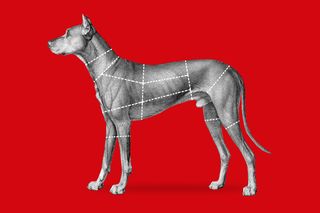
Nagaland’s Dog Meat Ban Is an Exercise in Bias, Not Animal Rights
The belief that some animals can be ethically consumed, while others can’t, is an irrational, arbitrary feeling that is completely subject to a person’s culture, upbringing and personal tastes.

The Indian state of Nagaland recently banned the sale of dog meat, after politician Maneka Gandhi shared photos she had received of captured dogs, urging people to stop the illegal dog meat trade, which she said has been going on “under the guise of culture.” Soon after Gandhi’s account sparked outrage among animal rights advocates, Nagaland’s Chief Secretary, Temjen Toy, tweeted that the state government had banned the practice. Animal rights advocates applauded the move, considering it a victory for dogs’ rights in India.
This chain of events, as rightly called out by some civil society groups, is deeply hypocritical. The world over, eating dog has become the marker of the ‘other,’ who is primitive, inhumane, and exploitative of cute animals that deserve to be protected and cared for. People around the world eat pigs, cows, goats, duck, fish, and myriad other animals, drawing the ire of only vegetarians and vegans, but not fellow meat-eaters. When it comes to man’s best friend, however, a sort of cognitive dissonance occurs, even among meat-eaters, in which the idea of eating dog immediately disgusts and horrifies people. We have taken this reaction as absolute truth, even building policies to allay the disgust. When we break it down, however, we realize this reaction is an irrational, arbitrary feeling that is completely subject to a person’s culture, upbringing and personal tastes.
Eating meat is a complicated process for humans. When we’re eating an animal, we’re hardly ever thinking beyond the food on our plate or paying mind to a living, breathing creature that was killed in order for us to have our meal. One way humans maintain this cognitive dissonance, or liberty to forget an animal’s pain, is to only eat animals that we believe lack complex emotions, making it easier to forget we’re killing them, social psychologist Brock Bastian writes in The Conversation.
Popularized as pets, dogs are one of the closest animals to humans, whose feelings and personalities we so often personify and glamorize. This empathy for intelligent animals’ rights, however, is quite selective and ignorant — for example, pork is one of the most popular meat in the world, readily available everywhere in India. But we don’t lay the same outrage on the killing of pigs, who are arguably as, or even more, intelligent and loving than dogs, even comparable to a three-year-old human infant.
Related on The Swaddle:
The Future of Meat May Not Require Animals
Different people, and cultures, find different animals cute, loving and undeserving of being reduced to food — this randomness is all the more reason we can’t dictate who eats what. Take horse meat, for example — in Europe and America, horses have been called the ‘poor man’s beef,’ especially in times of war, when the horse meat trade was thriving. Today, horses are served in France as delicacies, even as in the U.S., horse meat has largely fallen out of favor. The ups and downs in the horse meat trade, then, have historically been determined by factors such as wartime and economic recession, which have then shaped people’s opinion on the consumption of horse meat. Same goes for raw fish — historically, it has been a source of disgust in many parts of the world, until sushi was reinvigorated as a luxurious, elite delicacy that now enjoys its own celebrated niche in the culinary world. This time, the deciding factor was the immigration of Japanese people, and practices to other parts of the world, which transformed sushi from an everyday staple to a sign of educational and class standing in the West.
Take India as another example, where the deciding factor is politics — for the longest time, beef was commonly available in all parts of the country, enjoyed by meat-eating Indians as a delicacy, until the rise of Hindutva, aided by a nationalist government, effectively normalized the terrorizing of cow traders that has resulted in beef bans in some parts of the country. In all of the above examples, there isn’t one common thread that can explain the disgust or the favor these animal meats have enjoyed through time, which reveals that their consumption has been largely subject to the area’s history, politics and culture.
“Nearly all animals are edible,” Hal Herzog, a psychologist and the author of the book Some We Love, Some We Hate, Some We Eat: Why It’s So Hard to Think Straight About Animals, says on The Atlantic’s podcast, Gastropod. The history of humans’ experimentation with animal meats shows our meat-eating habits are not rational, logical, or even fixed. Condemning the practise of eating dog, then, only seeks to perpetuate racist, otherizing rhetoric against communities that consume dog meat, instead of making any headway for animal rights in the meat industry. This labeling of certain kinds of meat as disgusting is a tool to further perpetuate us-versus-them rhetoric, one that some regions in the Northeast are all too familiar with when perceived from the mainland gaze.
The debate here is not whether we should or should not eat meat. It’s about what we, as a society, sanction for consumption, and what we disparage. What we should be looking at is the treatment of these animals, and where we can fix cruelty when they’re alive. As anthropologist Dolly Kikon writes in Scroll, the rest of India has a long history of treating stray dogs as an urban menace, often embarking on elaborate campaigns to mass murder them. But, “thinking of dog meat as part of a food system, or linking it to larger issues of food culture or taste, does not cross the minds of many Indians,” Kikon writes. “That is the reason why, although stray dogs are defined as pests and killed by state authorities every day, it is morally incomprehensible to label them as a food choice.”
It’s not for any of us to decide what is okay to eat and not, because history shows the basis for how we’ve made these decisions in the past is irrational bias, not informed opinion. We do need to take into account certain factors when consuming meat — is the animal heading for extinction? Is the animal part of a species that is particularly suited for carrying a deadly pathogen? Is the animal being raised and fed in a humane way?
Outside of these factors, trying to dictate what people can or can’t eat is mostly an exercise in racism, not animal rights.
Rajvi Desai is The Swaddle's Culture Editor. After graduating from NYU as a Journalism and Politics major, she covered breaking news and politics in New York City, and dabbled in design and entertainment journalism. Back in the homeland, she's interested in tackling beauty, sports, politics and human rights in her gender-focused writing, while also co-managing The Swaddle Team's podcast, Respectfully Disagree.
Related


ILO: Job Losses Due to Covid19 Have Already Disproportionately Hit Women
